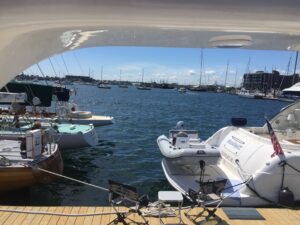By Maryanne Hanlon
Have you ever wanted to be lulled to sleep with the gentle rocking of a boat, while the waves softly tap the hull? Wake up to the smell of the salt air and the calmness of the harbor before it begins its day while having your coffee in the captain’s chair. Can you see yourself enjoying the sunset while having cocktails and dinner on the deck? Then perhaps tomorrow you’ll relocate to a different anchorage to maximize the sunrise.
It’s not as far-fetched as you might think. After living in a 4000-square-foot house in the suburbs for 20 years, my husband and I dreamed of simplifying our lives and living onboard. We had owned several boats to take day trips with our kids, so we were familiar with the lifestyle and boating rules, and we envisioned doing it more often.
So, we did. Two years ago, we sold our house and most of our belongings, and now live on our boat at Newport Harbor Hotel and Marina in Newport, R.I., May through October. It’s not for the faint of heart, but it’s liberating, and we’re so glad we made this switch.
It’s particularly relevant now given the current real estate market, which is skyrocketing on Aquidneck Island due to increased demand from second home owners who can work remotely and want a better quality of life. So, selling your home will put money in the bank and allow you to explore the coast in your new home – a boat. If you dream of living on a boat, or think maybe it’s not for you, here are tips and tricks that might help you see the light.
 #1. REDUCE
#1. REDUCE
It should come as no surprise that there is little storage on boats, so clearing out the house is a must. This is not a bad thing. Think of it as a new beginning! We all have stuff in closets and basements that we don’t need or use, and it feels cathartic to get rid of it! Donate it to a worthy cause or just throw it away. I reduced items in my house to those I couldn’t live without, which filled half of my former dining room. We pared down to a few summer outfits that we store onboard. The rest of our clothing, furnishings and family mementos are in a 12’x12’ storage unit.
Our 32’ boat is like camping, and has limited space for extras, from the v-berth to the galley kitchen. This forced us to keep only what we really need. We shop daily for food, as our fridge is smaller than the one in your college dorm room! But we discovered that having a big kitchen and dining room wasn’t important. We still entertain on the boat, even socially distanced, and spend time with our friends who care more about our company than our big house.
 #2. EXPENSES & MAINTENANCE
#2. EXPENSES & MAINTENANCE
Living on a boat is less expensive than living in our house, guaranteed. Marinas charge a price per foot on the dock (ours is $300/ft for the season), which comes with utilities, cable and Wifi, and access to the hotel’s amenities. We enjoy the hotel bar and firepit without the maintenance, walkability to downtown as well as a water view that we never could afford on land. It’s like living in a small condo, with no extra fees and no one telling you what color to paint.
We do still maintain the boat, and those fees can add up if you hire outside vendors, but we do most of it ourselves so it’s an affordable way to live on the water. Overall, we’re saving tens of thousands of dollars each year by living on our boat in the summer, and renting an apartment downtown each winter.
Our regular maintenance and costs include annual engine tune ups, cleaning and painting the hull each spring, updating electronic and navigational systems as needed, and hauling and launching the boat each season. While the list goes on, it’s much less than a home, as the boat is only 32 feet in length, versus a 4000-square-foot house plus landscaping. Even if we had a smaller house, the math works in our favor.
#3. OH CAPTAIN, MY CAPTAIN
There are myriad rules and regulations of boating, so don’t expect to be invincible on your first day. If you’re a novice boater, start with Coast Guard classes or take lessons at Sail Newport to learn how to handle a boat, the vocabulary, and other tips. Weather is unpredictable, so you must be able to navigate in a storm, in the cold, when a halyard breaks, and when the boat’s rocking. Google Maps doesn’t exist for the ocean, so you need to be able to read navigational maps and rely on electronics to direct you.
If you do have experience, you should give it a try, even if just for the summer to see if it works for you. It’s not for everybody, but with the pandemic, people are starting to reevaluate their lifestyles, what’s important and what’s not important. So, this might be the best opportunity for you to take an adventure of a lifetime. I have learned that living our life for the experiences is far more valuable than caring for a big house, and we’re not spending all our money on a large home that feels empty without the children living there. I would never go back to the nick knacks and clutter, and we’re living a much happier lifestyle. Maybe you could too.
For more about Maryanne Hanlon and her listings, click here.



